Less EU and more euro area after a German model with British ornament and a French facon
Adelina Marini, January 3, 2011
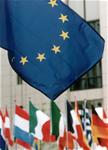 I am not convinced that we actually take stock of what is going on in the European Union, especially in the euro area. In fact, ever since the EU started to enlarge, no one actually realised what was going on in it, no matter the fact that it started to institutionalise more closely, to integrate more against the backdrop of accelerated national policies and defending of national interests. What remained unnoticed however, was that some member states' national interests are either European or overlap with common European interests. And another thing that was left without sufficient attention was that enlargement took place without the necessary preparation and without formulating clearer criteria, aside from the purely technical ones, like a common values system.
I am not convinced that we actually take stock of what is going on in the European Union, especially in the euro area. In fact, ever since the EU started to enlarge, no one actually realised what was going on in it, no matter the fact that it started to institutionalise more closely, to integrate more against the backdrop of accelerated national policies and defending of national interests. What remained unnoticed however, was that some member states' national interests are either European or overlap with common European interests. And another thing that was left without sufficient attention was that enlargement took place without the necessary preparation and without formulating clearer criteria, aside from the purely technical ones, like a common values system.
A very simple budget
Another portion of this interparalel and subtle process started yet in the end of October when the British Prime Minister appeared for a European Council in Brussels for a second time, since he has been elected in office. Instead of the expected by the newer member states shyness and vexation, he appeared among his colleagues with a head held high and a file which he put on the table in the very beginning of the sessions and said that he wanted a new point in the agenda - a discussion of the budget of the EU for 2011. The surprise was great but what was more surprising was that the point was not only accepted but also inserted as first on the agenda against 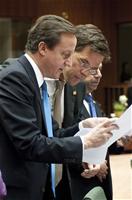 the backdrop of the expectations about the much more important issue of economic governance and the debt crisis in the eurozone.
the backdrop of the expectations about the much more important issue of economic governance and the debt crisis in the eurozone.
What David Cameron wanted was European Parliament's proposal for an increase of Community's budget for 2011 by nearly 6% not to be accepted because of the efforts of most member states, especially of Mr Cameron's, expenses to be cut and the debt to be reduced. British PM's wish the budget to be increased with no more than 2.9% was supported by all leaders, including Bulgarian PM Boyko Borissov who, by the way, had no idea how this increase would influence Bulgaria's annual installments to the European budget this year. And he not only did not know but did not know this in a moment when the national budget was already in Parliament for approval.
David Cameron's move caused a mini crisis in the European Union because it created a real threat the Community to be left without a budget in 2011. After all a compromise was found and European Parliament's fins that grew too much with the entry into force of the Lisbon Treaty, receded. There is a budget, but ....
Episode 2
At his third participation in the European Council the British prime minister made another move, even more surprising and shocking. This time, however, it was not made in public. He sent a letter to his colleagues on the second day of the December Council on December 17, in which he called member states' contributions in the remaining years of the current financial framework (2007-2013) to be kept and for the next one (2014-2020) to be increased with no more than inflation for that period. This practically means a freezing of the budget.
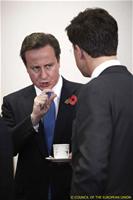 Furthermore, Mr Cameron wanted next financial perspectives to be defined on the basis of the common level of spending of the EU. This means that the level of commitments (one of the pillars of the common budget) to be in line with the budgetary stabilisation measures of the member states. Separately, the commitments should not exceed the level of increase in 2013 compared to the growth in inflation.
Furthermore, Mr Cameron wanted next financial perspectives to be defined on the basis of the common level of spending of the EU. This means that the level of commitments (one of the pillars of the common budget) to be in line with the budgetary stabilisation measures of the member states. Separately, the commitments should not exceed the level of increase in 2013 compared to the growth in inflation.
In the end of this letter David Cameron writes that it is possible Union's ambitious policies to be applied even with a stable volume of expenditures, meaning better spending of available funds. "The challenge for the European Union in the coming years will not be to spend more, but to spend better. This challenge can be met by improved European spending efficiency, accurate tracking of incurred commitment appropriations, seeking out where we can gain economic leverage and simplifying the financial framework", David Cameron writes in his letter.
The letter has already been supported by four member states: the Netherlands, Germany, France and Finland.
What does this letter mean?
In fact Britain is one of the net donors of the European budget and receives much less from it. This is the reason for the rebate, won yet by Margaret Thatcher, which still evokes disputes every time the next multiannual framework is being negotiated. Britain is not happy with the fact of only giving without receiving. Consequent British governments insisted during the negotiations for each financial framework more money to be spent on economic growth boosting policies, as well as for science and research, high tech. Although slowly and gradually, these insistences bear fruit. In most cases the main clashes are between Britain and France as Paris wants the volume of the Common Agriculture Policy to be kept as France benefits the most from it.
Now, however, Britain has a new ally in the face of Germany which also thinks that spending should be more efficient without this imposing an increase of the budget. This opinion is in harmony with the overall German position that no matter of European Commission's reports that the common budget policy has led to an increase of member states' wealth, given the current debt crisis it is obvious that something is wrong.
What is wrong?
This is supposed to be a rhetoric question, especially if we ask it in Bulgaria. This 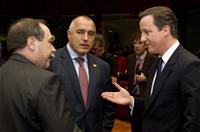 is why I will not discuss it too much here. But if looked from Poland, this question is not at all rhetoric because Poland, aside from being among the largest beneficiaries of money from EU's budget, it also has a big net contribution in it. Besides, for the years before its membership and even afterwards, Warsaw proved that EU funds are extremely useful for its catching up the more developed and older member states. Poland is also an emblematic example of a successful accession. It is no accident that it was Poland that sharply reacted against the British proposal.
is why I will not discuss it too much here. But if looked from Poland, this question is not at all rhetoric because Poland, aside from being among the largest beneficiaries of money from EU's budget, it also has a big net contribution in it. Besides, for the years before its membership and even afterwards, Warsaw proved that EU funds are extremely useful for its catching up the more developed and older member states. Poland is also an emblematic example of a successful accession. It is no accident that it was Poland that sharply reacted against the British proposal.
After all, we have to note that Poland was one of the very few (to avoid saying the only) country in the European Union which remained dry during the global financial and economic crisis, and currently it still is sheltered from the problems in the euro area. Polish economy has been growing all the time while many of its European partners were in recession and now have unconvincing recovery. But Poland still needs help in order to complete some of the most difficult reforms, like the pension reform. This is why Poland sought support among its partners from New Europe, among which Bulgaria too, in its wish pension reforms spending to be deduced from the budget deficit.
Regretfully, however, Poland is practically alone in this wish because it is among the few that hold real, and I mean real reforms. And this is what is wrong - the EU has too many over-indebted and unreformed members which are a burden to those who both pay more and do what is necessary to optimise their spending so that they could develop better.
Not a disintegration but a consolidation
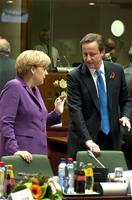 The conclusion from Britain's strategic move could be only one - the rich, the capable and the having will to tackle problems member states are taking control over EU's governance. In response to the criticism that this is discriminatory and is against Europe's principles for solidarity I would say, on the contrary - this is exactly what reaffirms the principles of solidarity, perceived in terms of common wishes, common goals and equal contributions and not in terms of the rich pouring in the bottomless holes of the poor who had chosen to be victims of .... international situation.
The conclusion from Britain's strategic move could be only one - the rich, the capable and the having will to tackle problems member states are taking control over EU's governance. In response to the criticism that this is discriminatory and is against Europe's principles for solidarity I would say, on the contrary - this is exactly what reaffirms the principles of solidarity, perceived in terms of common wishes, common goals and equal contributions and not in terms of the rich pouring in the bottomless holes of the poor who had chosen to be victims of .... international situation.
So if anyone is speaking of an upcoming perspective for a breakdown of the euro area and therefore of the EU, this is more likely to be a consolidation. If you wish you can comprehend it as a unification in a new club - this time of the capable and knowing, and not of the wanting and politically the necessary (because geostrategic useful countries are no longer needed, but rather - financially stable states).
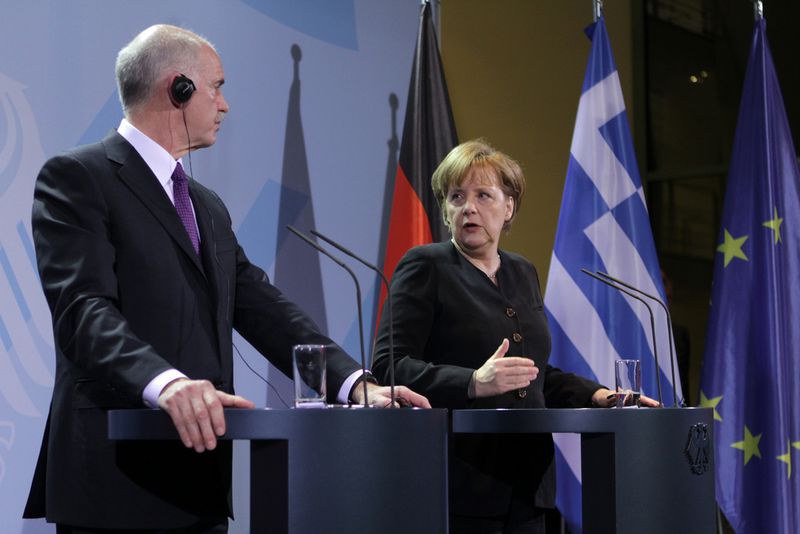 | © www.primeminister.gov.gr
| © www.primeminister.gov.gr | © European Commission- Audiovisual Service
| © European Commission- Audiovisual Service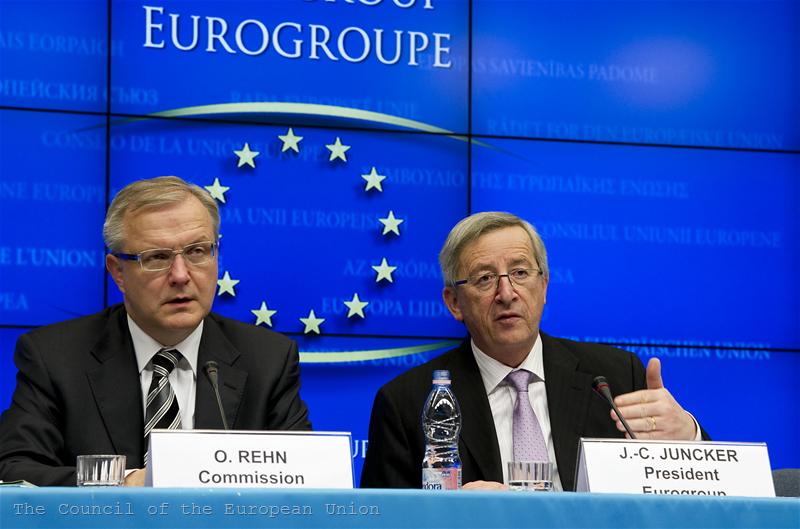 | © The Council of the European Union
| © The Council of the European Union